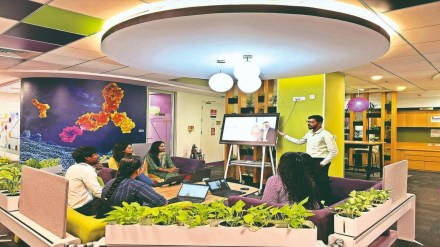Global capability centres (GCCs) in India are on an accelerated growth path, rapidly evolving into strategic hubs for innovation and high-value functions. There are now 1700+ capability centres present, mostly located in Bengaluru, Pune, Hyderabad, and Chennai, generating $64.6 billion in export revenue (FY2024), and employing close to 1.9 million employees. Are they outpacing traditional IT service providers? Recent trends indicate that GCCs manage to hire better talent at higher salaries while still maintaining lower overall costs compared to traditional IT services firms.
GCCs engage in R&D, product development, and global business strategies, positioning themselves as value creators rather than cost centres. Their ability to recruit top talent, especially from Tier 1 cities and prestigious campuses, paired with operational efficiencies, makes them a powerful force in India’s tech landscape, according to Neeti Sharma, CEO, TeamLease Digital, a staffing solutions company.
Typically, 50% to 60% of hires in GCCs is coming from IT biggies like TCS, Infosys, and Wipro, while around 20% to 25% of their workforce is sourced from elite institutions such as IITs, NITs, and IIMs, ensuring a steady influx of fresh talent equipped with the latest in technology and business acumen. Moreover, 15% to 20% of hires come from startups and industry leaders in sectors like BFSI, telecom, and healthcare, injecting agility and entrepreneurial spirit, she added.
“These centres offer competitive salaries — often 15-30% higher than traditional IT services firms — while maintaining 30-40% lower overall costs compared to their global counterparts. For instance, a fresher employed at a GCC will command a package of
Rs 7 lakh+ per annum, compared to Rs 5 lakh drawn at a IT products and services firm,” Sharma revealed.
“We actively source talent from both fresh graduates and experienced professionals,” said Gopinath Pullaihgari, senior director & head —HR, Verizon India. “Our campus recruitment efforts allow us to engage with some of the brightest minds directly from universities and engineering colleges where a majority of our operations are based, while also prioritising hiring industry experts across various verticals to drive specialised innovation and growth,” he added.
With over 7,000 employees in Chennai, Hyderabad and Bengaluru, the India GCC contributes significantly across diverse areas such as emerging technologies, cybersecurity, telematics, and enterprise solutions. The India team has made significant contributions to Verizon’s intellectual property, filing over 90 patents since 2020 alone.
Ditto is the case with AstraZeneca India, with over 4,000 employees across two locations. “In Chennai, the Global Innovation & Technology Centre (GITC) houses Global Business Services (GBS), IT, global supply chain and finance functions while our multi-functional hub in Bengaluru houses R&D, GBS and IT,” said Anuradha Kumar, head of HR, GITC, AstraZeneca India. “By focusing on a balanced approach to hiring, competitive salaries, and ongoing employee development, the GITC positions itself as a leading player in the GCC ecosystem,” she said.
India produces over two million engineering graduates annually, a talent pool the global fintech player, Broadridge, actively taps into by partnering with premier engineering colleges across the country. “In fact, around 20% of our yearly hiring comprises campus graduates,” said Sheenam Ohrie, managing director, Broadridge India. The company has 5,200 associates at its two locations in Bengaluru and Hyderabad.
With the demand for skilled talent in the financial and tech sectors growing, especially within the GCC landscape, Broadridge is focusing on cultivating a robust talent pool that meets industry demands. “In FY24 alone, we visited 33 colleges across the width and length of the country. This approach – where we reach out to colleges beyond Tier I cities — has been a cornerstone of our hiring practices over the past few years,” Ohrie said. “Across these campuses, our mission is to introduce domain-specific courses for students, allowing us to train them in mainframe coding for three years. We are also exploring ways to incorporate BFSI-related credit courses into academic curricula, ensuring that graduates are industry-ready,” she added.
“The skills in demand for GCCs usually include functional expertise in procurement, finance, HR, supply chain, engineering and technical expertise in areas such as software development, data analytics, cloud computing, ai, and ML,” said Abhishek Jain, India GCC head, The Lubrizol Corporation, a Berkshire Hathaway company and a leading player in specialty chemicals.
Jain admits that attrition can be an area of concern for GCCs, as retaining top talent in a competitive job market can be challenging. “India possesses a rich reservoir of talent and potential across various skill domains. However, to effectively enhance skills development, it is imperative to address specific key areas. Firstly, there is a necessity to overhaul the skill development programmes to ensure their alignment with the evolving industry needs. Additionally, the utilisation of technology-enabled learning platforms can significantly enhance the quality and relevance of skill development initiatives,” he remarked.
Anuradha Kumar from AstraZeneca concurs. “There are areas for improvement, such as, aligning education with industry needs, continuous learning opportunities, and collaboration between industry and academia to ensure curriculum relevance and practical experience for students,” she summarised.
